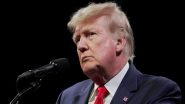New York, Dec 27 (PTI) It was a dramatic year for the US in which President Joe Biden abandoned his reelection bid after his poor performance in a nationally televised debate against Republican candidate Donald Trump, a convicted felon who survived two assassination attempts during a bitter campaign.
Trump, 78, defeated Indian-origin Kamala Harris. His return to the White House after a gap of four years shattered the dreams of the Democratic Party and millions of her supporters who hoped to see the first woman President.
Trump is the first president after Grover Cleveland who was 132 years ago evicted from the White House and return to it again four years later.
As the Biden administration prepares to exit the White House, the India-US relationship is "in a very strong place” – according to a Biden administration official – and observers expect that bilateral ties will continue to receive bipartisan support under the incoming Trump presidency.
But at the end of 2024, new challenges are casting their shadow over these relations -- there is an ongoing indictment related to an alleged assassination bid on a Sikh separatist, another involving Indian billionaire Gautam Adani, and Trump's threat to impose high tariffs on Indian imports.
Months before the elections in the world's oldest democracy, the electorate in the world's largest democracy voted for Prime Minister Narendra Modi for a historic third term.
Modi congratulated his "friend" Trump - the oldest person in US history to be elected president - on his "historic" victory and said he looks forward to renewing their collaboration to further strengthen the India-US Comprehensive Global and Strategic Partnership.
His relations with both President Biden and Trump have been strong. Between June 2023 and September 2024, both Modi and Biden hosted each other in their countries, visits that underscored the strong trajectory of bilateral relations.
In June 2023, Biden hosted Modi for a State Visit in Washington and then travelled to New Delhi in September for the G-20 Summit.
In June 2024, the two leaders met in Italy on the sidelines of the G7 Summit.
Three months later, Modi travelled to the US for the 4th Quad Leaders' Summit held at Biden's home in Wilmington, Delaware.
After a bilateral meeting on the margins of the summit, Biden said the “US' partnership with India is stronger, closer, and more dynamic than any time in history.”
Later, a joint statement said the India-US partnership is "decisively delivering on an ambitious agenda that serves the global good," calling it the "defining partnership of the 21st century.”
However, the relationship was not without hiccups.
If the year 2023 had ended on a sombre note with the Biden administration charging Indian national Nikhil Gupta in a foiled plot to assassinate Sikh separatist Gurpatwant Singh Pannun on American soil, in October 2024, former Indian government employee Vikash Yadav was charged by US authorities for his alleged role in the plot.
In November, the US Securities and Exchange Commission charged billionaire Gautam Adani and his nephew Sagar Adani, along with Cyril Cabanes, an executive of Azure Power Global Ltd., in connection with an alleged USD 250 million bribery scheme.
In a parallel action, the US Attorney's Office for the Eastern District of New York unsealed criminal charges against Gautam and Sagar Adani and others. The criminal indictment also charged Vneet S Jaain, Ranjit Gupta, Rupesh Agarwal, Cyril Cabanes, Saurabh Agarwal and Deepak Malhotra.
India said it is a “legal matter involving private firms and individuals and the US Department of Justice...there are established procedures and legal avenues in such cases” that would be followed.
It remains to be seen how the cases pan out during the incoming administration of Trump, who has picked several Indian-Americans for key positions.
Vivek Ramaswamy for the Department of Government Efficiency (DOGE), Tulsi Gabbard as Director of National Intelligence, Kash Patel as Director of the FBI, Harmeet K Dhillon as Assistant Attorney General for Civil Rights, Jay Bhattacharya as Director of National Institutes of Health and Sriram Krishnan as Senior policy advisor on Artificial Intelligence are among the Indian-Americans expected to play key roles in Trump 2.0 administration.
On the indictments, a senior administration official said the US-India relationship is "increasingly complex, increasingly diverse and increasingly deep. It is the case that invariably, we will reach occasions of challenges on both sides, and the key is how we deal with those."
“I can just assure you that we've had the deepest possible appropriate consultation between the two sides, and I'm confident that we will be able to weather this appropriately,” the official added.
As Trump prepares to return to the White House for his second term, his recent rhetoric to impose reciprocal tariffs in retaliation for the "high tariff" imposed by New Delhi on the import of certain American products has garnered much attention.
The outgoing Biden administration has said it expects that the India-US relationship will continue to remain strong even after the handover in January.
“We are quite confident that we'll be handing the bilateral relationship off to the incoming Trump team at its strongest possible apex, with key support from stakeholders in the industry, in technology, in finance and defence,” said Kurt Campbell, Deputy Secretary of State.
Principal Deputy National Security Advisor Jon Finer has said that “to a large degree, there has been bipartisan consensus on the importance of this relationship”.
“Over the last two decades, different administrations in Washington and New Delhi have helped strengthen our cooperation. While no relationship is without challenges, we believe that we are leaving this partnership in a very strong place as we prepare to pass the baton to the incoming team.”
(This is an unedited and auto-generated story from Syndicated News feed, LatestLY Staff may not have modified or edited the content body)













 Quickly
Quickly

















